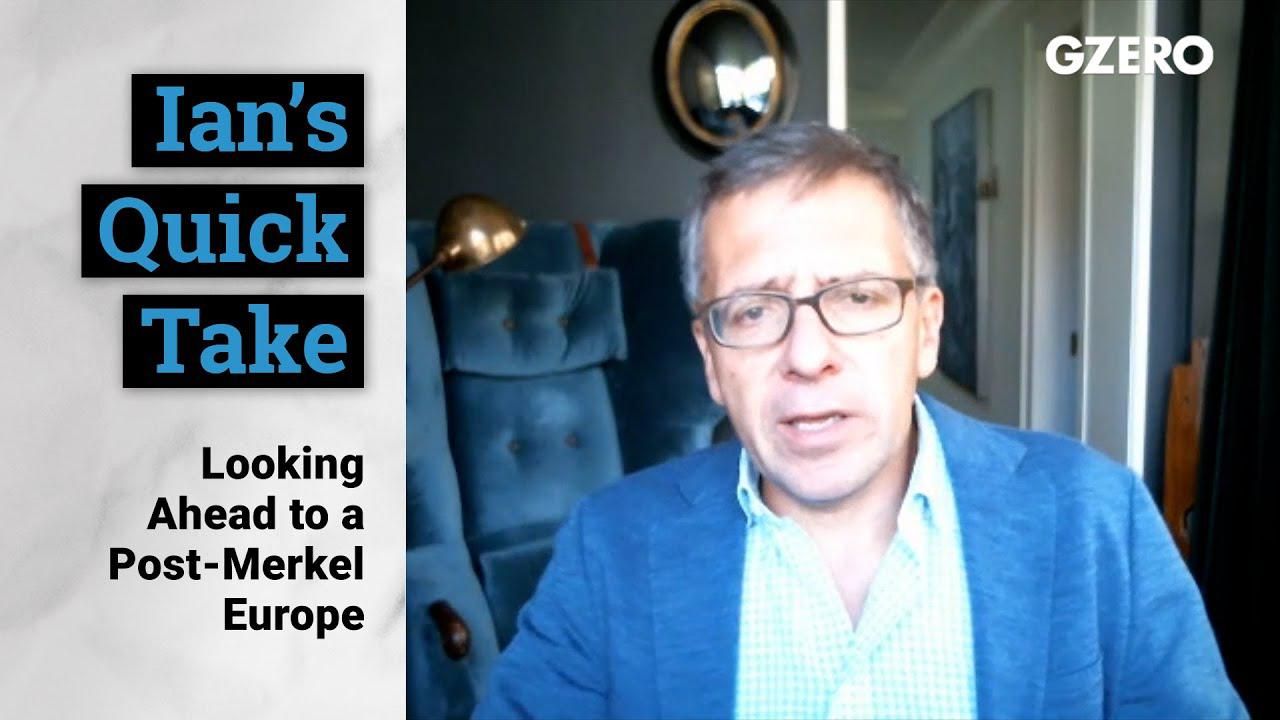Quick Take
Looking ahead to a post-Merkel Europe

Ian Bremmer: Looking Ahead to a Post-Merkel Europe | Quick Take | GZERO Media

Ian Bremmer's Quick Take:
Hi, everybody. Ian Bremmer here. Happy week to all of you and thought I'd talk a little bit about Germany and Europe. Because of course, we just had elections in Germany, 16 years of Angela Merkel's rule coming to an end - by far the strongest leader that Germany has seen post-war, Europe has seen since the collapse of the Soviet Union. And indeed in many ways, the world has seen in the 21st century. Xi Jinping, of course, runs a much bigger country and has consolidated much more power, but in terms of the free world, it's been Angela Merkel.
Now what we see from the election is a population that's generally content, not because Merkel's party did so well. In fact, they didn't. The CDU only came in second with 24% of the vote. The Social Democrats actually won it, almost 26% of the vote. But as frequently we see in Germany, it's broad coalitions. The interesting thing though, and the reason I say the Germans generally happy is because it's a centrist vote. It is a pro-establishment party's vote. The extreme parties on the right and the left actually loss support, particularly the Alternatives for Deutschland, the Euro skeptic, EU skeptic, anti-migrants, much more overtly nationalist party, actually lost about three points. They're down to about 10% now. And that's a big deal because in the story in the world and democracies over the past decade has been populism growing, anti-establishment sentiment growing, people believing that the countries, their governments don't really represent them, don't reflect their interests well. And as a consequence, they want to break things. Certainly, we're experiencing that in the United States. We're seeing it in Brazil to a degree. It's happening even in a place like Canada and the UK and France, but not in Germany.
In Germany, what we're seeing is strong support for centrism. This is a government that will be weaker because the leadership will be weaker. And because whether or not it's Olaf Scholz or Armin Laschet, and we won't know that for several weeks as the coalition building occurs, even though Scholz is most likely, either one of them with a three-party coalition will be much weaker on the European and the global stage than Merkel has been.
The takeaway is a lot of political continuity and stability in Germany, but weaker German leadership internationally. What does that mean? Well, for Europe, I mean, France of course, Macron has a very strong interest in being seen as the leader of Europe, but his interests are not aligned with a lot of the other Europeans. You saw that with the announcement of the recent US-UK-Australia, defense pact. France wants to be an Indo-Pacific power while the Americans increasingly aren't comfortable with him having that role and the EU doesn't really want to play along.
From the EU position, from the position of almost all the other countries inside Europe, not the UK, but the UK isn't in Europe anymore, they see the Indo-Pac region as an area of commercial interest, of industrial interest, of technology interest, markets, but absolutely not one where they want to play from a security perspective. And so the French government is trying to push the EU to develop this strategy. And he doesn't have a lot of support. He's trying to get them to develop a independent European defense capability, but most of the Europeans are perfectly happy being in NATO and they don't want to spend more on defense, even when the Americans tell them to for the preexisting group, they certainly don't want to do it for a new questionably effectiveness of an on its own EU force. They don't want to take leadership on the security side. So for all of those reasons, the French won't be as powerful.
The Italians have a great government. Super Mario, Mario Draghi, who is running a sort of technocratic government with almost all the parties in the country supporting him. It means lots of reforms in a time of surplus. It's fantastic for Italy for a couple of years, but it's Italy and it won't last long. And when it goes away, you'll have another succession of weak governments and weak prime ministers and it's a smaller economy than Germany and France. And their levels of diplomacy internationally are much lower than those of either of the other two countries.
So what that really tells you is individual European governments are going to matter less, which would be a problem for Europe if there wasn't an EU super structure, but there is. So what really is happening is the EU is going to matter more. Brussels is going to matter more in areas of their competence, on the environment, on trade, on tax policy, on technology, data, privacy. We're going to be all spending more time in Brussels.
That's my view. The restaurants suck. It's not a very interesting city. I'm sorry. It's a nice place, but we are going to be spending more time there. I certainly am. Anyway, that's it for me. Hope everyone's doing well. Be good. Talk to you soon.
Tune in on Saturday, February 14th at 12pm ET/6pm CET for the live premiere of our Global Stage from the 2026 Munich Security Conference, where our panel of experts takes aim at the latest global security challenges.
In this Quick Take, Ian Bremmer weighs in on the politicization of the Olympics after comments by Team USA freestyle skier Hunter Hess sparked backlash about patriotism and national representation.
In July 2024, Keir Starmer won the United Kingdom’s election in a landslide. It has been downhill ever since, with Starmer’s premiership sullied by economic stagnation, intraparty fighting, and a lack of vision for the country.